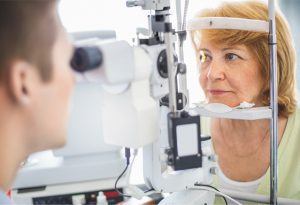 A vision test measures how well you see. A comprehensive eye exam, however, is designed to evaluate the overall health and function of your eyes, and capture any signs of disease early, often before they produce symptoms. Early discovery of eye disease promotes treatment before vision loss can occur or become more serious. Nearly all eye diseases cause no noticeable symptoms early in their course but, left untreated, some can lead to partial or even total blindness. Luckily, with the right treatment, eye diseases can be prevented, managed or even completely resolved. As with almost all health issues, early discovery is of utmost importance.
A vision test measures how well you see. A comprehensive eye exam, however, is designed to evaluate the overall health and function of your eyes, and capture any signs of disease early, often before they produce symptoms. Early discovery of eye disease promotes treatment before vision loss can occur or become more serious. Nearly all eye diseases cause no noticeable symptoms early in their course but, left untreated, some can lead to partial or even total blindness. Luckily, with the right treatment, eye diseases can be prevented, managed or even completely resolved. As with almost all health issues, early discovery is of utmost importance.
WHAT IS A COMPREHENSIVE EYE EXAM?
A comprehensive eye exam is a series of tests used to evaluate your overall eye health and function, as well as your risk of developing vision-robbing diseases going forward. Your eye doctor will ask about your personal and family medical history, review any medications you may be taking, and discuss any specific symptoms or concerns you may have. From there, your doctor will perform some or all of the following:
. Visual acuity test – This test measures how well your vision functions at various distances to see if you need a new or updated lens prescription.
. Refraction test – This measures your eyes’ ability to focus light.
. Eye pressure test – This assesses the pressure inside your eyes. Excess pressure is often a sign of glaucoma.
. Dilated pupil exam – This test allows your doctor to examine your retina for any signs of disease or damage.
. Ophthalmoscopy – A bright light is used to look at the back of the eye to evaluate the optic nerve and related structures.
. Visual field test – This examines your peripheral vision to help isolate problems such as blind spots or areas of diminished vision.
. Eye movement test – This test evaluates the movement and coordination of your eye muscles, which can relate to certain eye conditions and disorders.
. Color vision test – This gauges your ability to distinguish different colors, which can be relevant to certain vision problems.
Typically, a comprehensive eye exam takes about 30-60 minutes. Most people can drive after their appointment, but if you’re having a dilated pupil exam and your eyes are particularly sensitive to light, you may want to ask someone to drive you.
HOW OFTEN SHOULD I GET A COMPREHENSIVE EYE EXAM?
Asymptomatic, low-risk adults should get a comprehensive eye exam as follows:
. 18-38: at least every two years
. 40-64: at least every two years
. 65 and older: at least once a year
People above average risk should get a comprehensive eye exam at least once a year, or more often if recommended by their eye doctor or healthcare provider. An elevated risk of eye disease is associated with the following factors:
. Being 65 or older. Age can increase the risk of certain eye conditions and diseases like cataracts, age-related macular degeneration (AMD), glaucoma, and diabetic retinopathy.
. A personal or family history of eye disease. Some eye diseases, like glaucoma, cataracts and AMD, run in families.
. Having diabetes. People with diabetes have an increased risk of developing diabetic retinopathy, glaucoma and cataracts.
. Having glaucoma. Glaucoma is a progressive eye disease, making regular eye exams essential for monitoring its evolution as well as the effectiveness of medication or treatment.
. Having high blood pressure. High blood pressure increases the risk of retinopathy, choroidopathy, and optic nerve damage.
. Taking drugs. Prescription and non-prescription drugs can affect vision, including some medications prescribed to treat the heart, osteoporosis, cancer, ED, and others.
. Being of African, Latino or Asian heritage. People of African and Latin American descent have a higher risk of developing diabetic retinopathy, glaucoma and cataracts. Asians are at greater risk for developing angle-closure (acute or narrow-angle) glaucoma.
. Wearing contact lenses, particularly 24-hours-a-day lenses.
. Having had an eye injury. Prior eye trauma can be a risk factor.
. Having undergone eye surgery, including refractive surgeries like LASIK, PRK, PTK, etc.
Having regular eye exams helps to ensure that any potential issues or concerns can be treated while they are still manageable, even reversible. With regular eye exams, you can help protect your vision, personal safety and quality of life.
If it has been a while since your last comprehensive eye exam, don’t wait. A little time out of your day now can help secure your healthy vision for all the amazing times ahead.
How Often Do I Need an Eye Exam?
Regular comprehensive eye exams can help protect your eyes and vision from permanent damage, including blindness. Find out how often you should see your eye doctor.
Lake Eye Associates
352-632-2020
 Central Florida Health and Wellness Magazine Health and Wellness Articles of the Villages
Central Florida Health and Wellness Magazine Health and Wellness Articles of the Villages



